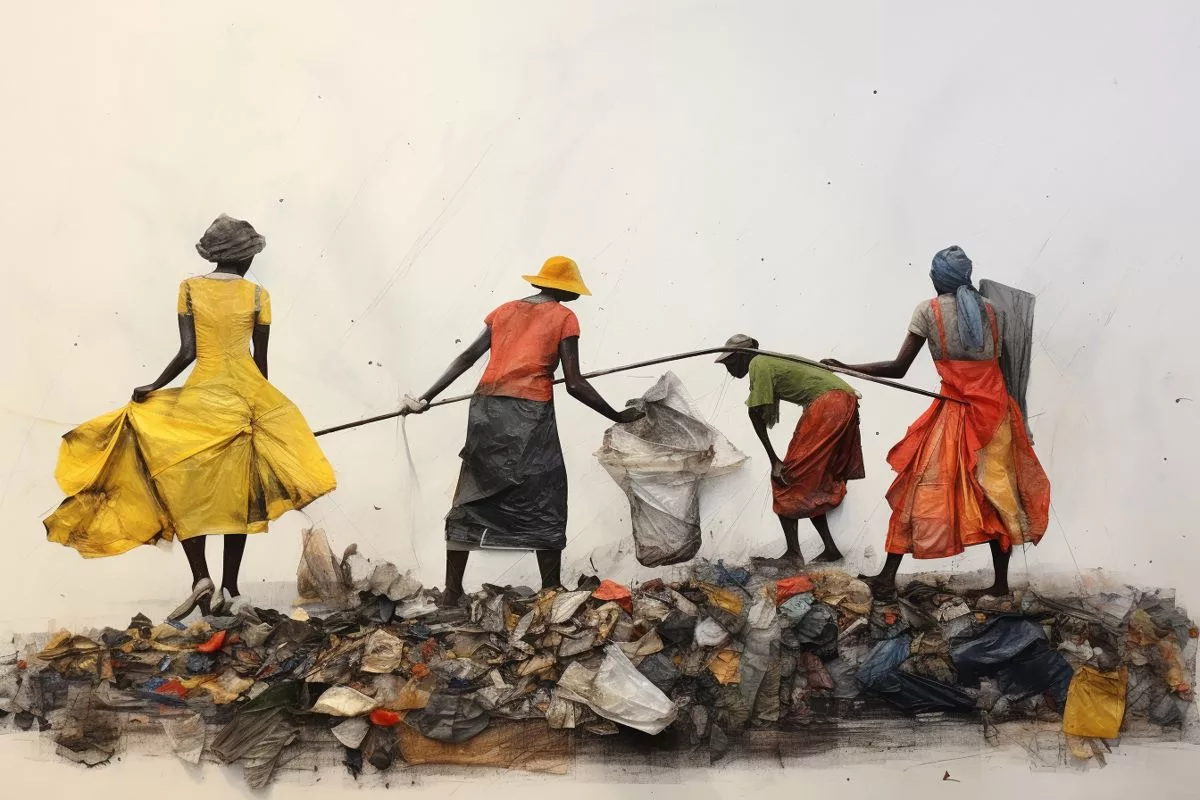South Africa is taking unique and proactive measures to combat plastic pollution, including the South African Plastics Pact and government-led actions. They aim to eradicate unnecessary and problematic plastic products, ensure plastic packaging is reusable, recyclable, or compostable, and have 70% of plastic packaging effectively recycled by 2025. The government has also implemented The National Waste Management Strategy and introduced regulations for recycled content in plastic carrier bags. These measures have led to the disposal of 368,600 tons of plastic waste, created jobs, and supported waste reclaimers. However, regulatory measures and enforcement remain crucial in eradicating problematic plastics from our ecosystems.
South Africa’s Unique Approach to Battling Plastic Pollution
South Africa is making significant progress in the fight against plastic pollution through initiatives such as the South African Plastics Pact and government-led actions. Their strategy involves voluntary industry measures, community waste disposal, and Extended Producer Responsibility schemes. The SA Plastic Pact aims to eradicate unnecessary and problematic plastic products, ensure plastic packaging is reusable, recyclable, or compostable, and have 70% of plastic packaging effectively recycled by 2025. The government has also implemented The National Waste Management Strategy and introduced regulations for recycled content in plastic carrier bags.
South Africa is grappling with the global plastic pollution crisis just like the rest of the world. A shocking revelation from the United Nations Environment Program discloses that across the globe, an average of one million plastic bottles are purchased every minute, and around five trillion plastic bags are used every year. This disturbing level of consumption has led to a prediction that by 2050, the amount of plastic in the oceans will weigh as much as 33 billion elephants, according to a recent article in Business Day.
The effects of plastic pollution, particularly microplastics, are so significant that they have been found in the earth’s fossil records. This aspect defines our current geological era, the Anthropocene. The plastic pollution crisis has even led to the creation of a unique marine microbial habitat known as the “plastisphere”. To address this growing crisis, the global community has been urged to unite in the fight against plastic pollution. As a result, the Fifth Session of the United Nations Environment Assembly (UNEA5), held in 2022, concluded that a legally binding agreement is necessary to guide global efforts to eradicate plastic pollution.
However, the execution of these global measures has encountered obstacles. For instance, the third session of the Intergovernmental Negotiating Committee, held to review the initial draft of this agreement, faced opposition. South Africa and other member states proposed inter-sessional work to share information on problematic and avoidable plastic products, but a consensus could not be reached.
South Africa’s Unique Approach to Battling Plastic Pollution
Amid these global challenges, South Africa is making significant progress through initiatives such as the South African Plastics Pact and other government-led actions. When the Minister assumed office over four years ago, there were calls for a ban on short-lived and single-use plastics. However, she believed a combination of voluntary industry measures, enhanced community waste disposal, and the establishment of Extended Producer Responsibility schemes was a better solution.
This strategy has been successful, as the SA Plastic Pact has identified and targeted unnecessary and problematic plastic products. The pact is committed to eradicating these problematic plastics and ensuring all plastic packaging is reusable, recyclable, or compostable. Furthermore, by 2025, the pact aims to have 70% of plastic packaging effectively recycled and 30% average post-consumer recycled content included in plastic packaging.
The South African government, in conjunction with the SA Plastics Pact, has implemented The National Waste Management Strategy. This policy aims to enhance municipal waste management services to prevent plastic from entering the environment, encourage waste diversion from landfills through various techniques, and increase public awareness and cleanup campaigns.
Measures and Results of South Africa’s Plastic Pollution Initiative
The proactive measures taken by the government have led to the disposal of 368,600 tons of plastic waste from the environment and created seven and a half thousand formal jobs. Furthermore, it has supported the livelihoods of between 60,000 and 90,000 waste reclaimers.
Additionally, in 2023, the government introduced a regulation requiring at least 50% recycled content as part of the product design measures for plastic carrier bags. By 2027, plastic carrier bags and black trash bags are expected to be made entirely from recycled materials.
In an attempt to curb the widespread issue of illegal dumping, the government initiated the Municipal Cleaning and Greening program. The program aims to eliminate 7251 illegal dumpsites, creating more than 37,000 job opportunities within the public works program.
The government has also identified 40 municipal landfills for improvement through a public/private partnership model. Combined with the acquisition of specialized waste management vehicles, this initiative has significantly enhanced household collection and landfill management across the country.
Despite these accomplishments, the government acknowledges the importance of regulation and enforcement in combating plastic pollution. It realizes that the issue of problematic plastic products threatens the reputation and future of all plastic products. Thus, regulatory measures are crucial to ensuring higher compliance in eradicating problematic plastics from our ecosystems and compelling those who have refused to join the Plastics Pact to adopt the system changes being implemented.
The Road to a Plastic-Free Future
The path to a future without plastics is challenging and lengthy, but through combined efforts, change can be achieved. As South Africa continues its journey to combat plastic pollution, it serves as a beacon, demonstrating the commitment and innovative strategies necessary to safeguard our environment for future generations.
1. What is South Africa’s strategy to combat plastic pollution?
South Africa’s strategy involves voluntary industry measures, community waste disposal, and Extended Producer Responsibility schemes. The SA Plastic Pact aims to eradicate unnecessary and problematic plastic products, ensure plastic packaging is reusable, recyclable, or compostable, and have 70% of plastic packaging effectively recycled by 2025.
2. What initiatives has South Africa introduced to tackle plastic pollution?
The South African government, in conjunction with the SA Plastics Pact, has implemented The National Waste Management Strategy and introduced regulations for recycled content in plastic carrier bags. The government has also initiated programs such as Municipal Cleaning and Greening to eliminate illegal dumpsites and identified municipal landfills for improvement through a public/private partnership model.
3. How much plastic waste has South Africa disposed of through its initiatives?
The proactive measures taken by the government have led to the disposal of 368,600 tons of plastic waste from the environment.
4. What is the goal of the SA Plastic Pact?
The SA Plastic Pact aims to eradicate unnecessary and problematic plastic products, ensure plastic packaging is reusable, recyclable, or compostable, and have 70% of plastic packaging effectively recycled by 2025. Additionally, by 2025, the pact aims to have 30% average post-consumer recycled content included in plastic packaging.
5. Has South Africa introduced any regulations for plastic carrier bags?
In 2023, the government introduced a regulation requiring at least 50% recycled content as part of the product design measures for plastic carrier bags. By 2027, plastic carrier bags and black trash bags are expected to be made entirely from recycled materials.
6. What is the government’s stance on regulatory measures in combating plastic pollution?
The government acknowledges the importance of regulation and enforcement in combating plastic pollution. It realizes that the issue of problematic plastic products threatens the reputation and future of all plastic products. Thus, regulatory measures are crucial to ensuring higher compliance in eradicating problematic plastics from our ecosystems and compelling those who have refused to join the Plastics Pact to adopt the system changes being implemented.








